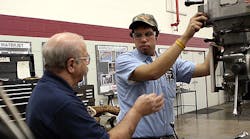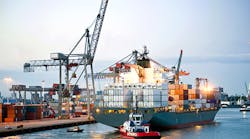For two years the anticipation was building, and not all of it was enthusiastic. The American Foundry Society’s and the North American Die Casters Assn.’s decision to stage a single trade show was thought to be radical in 2003. Some people with long personal and professional experience in metalcasting objected to the consolidation of the trade associations’ events, and resented the notion that another link to the past was falling away. Coming at the low point in a long, slow business cycle, it was hard to answer those objections.
Now, we know the outcome and it’s a whole new story. CastExpo ‘05 drew 10,012 visitors from 44 countries over four days in April. Exhibits presented by 470 companies and organization stretched out over acres of floor space, presenting hours of news, insights, and commercial opportunities for everyone.
Just as important as these facts was the word-of-mouth reporting, notably among the exhibitors I spoke to during and after the event.
Much of the success at CastExpo was the result of a stronger economy and better operating conditions for metalcasters. All is not perfect, but demand for castings has improved in the past year and that encourages our outlook. And my sense is that this supplies a hint to a broader reason why the event had such a positive effect.
Many who objected to AFS and NADCA co-staging the event were clinging to an image of the past. More specifically, they were clinging to their personal impressions of how things once had been: fuller order books, higher levels of revenue, memories of the good fellowship at past trade shows. Maybe those recollections are accurate or maybe they aren’t. The fact is they are essentially personal recollections.
Other objections were based on a misunderstanding of the market for this trade show. Foundries are not diecasters and diecasters aren’t foundries, they contend. The truth is that foundries and diecasters have more in common than they have separating them. Most important, they have common suppliers of equipment, goods, and services.
Events like these aren’t staged for the sake of tradition, or for entertainment, though both are positive effects. CastExpo and other trade shows are intended to facilitate commercial activity.
If this seems obvious to you, it’s important to note that foundries and diecasters need their suppliers to do well almost as much as they need to succeed on their own. A great proportion of the research and product development is carried out by commercial interests, not metalcasters. They are the principal means by which good ideas are financed, tested, and tried, and then transmitted from one metalcaster to another.
CastExpo was a success because it did not recreate the past, because its planners recognized the common needs of foundries and diecasters, and brought all of them together for a suitable exchange. It showed there’s more value in the future than in the past. Beyond everything else that was accomplished, above all the individual successes and awards, this is an example of forward thinking that is worth remembering.
One detail of that weekend is worth special attention. AFS presented its Ray H. Witt Award to Ashland Casting Solutions’s Ruben Bake, for a presentation he made at the 2004 Metalcasting Congress: “Tools for Developing a Fact-Based Marketing Plan.” This is a prestigious award, and I’ve worked with Ruben on other matters, so when I called to congratulate him I wasn’t surprised by his modesty over the achievement.
But, AFS obviously sees it’s an important statement. It’s an outline for the many foundries that need to understand better themselves, their products, their customers, and their potential.
“Marketing” is not “sales,” Bake explains. Marketing is a strategy that supports sales, and it involves continuous market analyses, assessing customers’ needs, monitoring industry trends, and benchmarking the competition. “Most of these things appear to be common sense, and foundries do them intuitively to some degree,” he writes. “But, to effectively grow and sustain your casting business, you need to develop a marketing ‘plan.’ This plan needs to be based on facts, not only intuitions or past experiences.”








